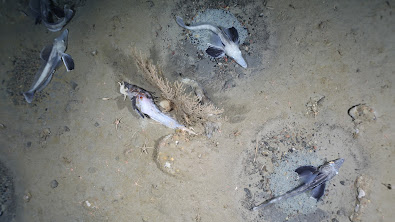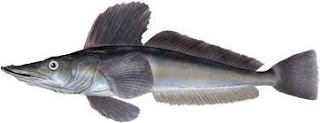Thursday, January 13, 2022
Nesting Icefish
Scientists on a German icebreaker called the RV Polarstern were towing an underwater camera across the floor of the Weddell Sea off Antarctica. They were investigating this area because comparatively warm water – 3.6 Celsius, or 38.5 Fahrenheit – was welling up there. They found that someone else was interested in this warm water: about 60 million nesting icefish. This species of icefish (Neopagetopsis ionah) lay about a 1,700 eggs in each of these seafloor nests, which the adults then tend. The fish had previously been known to nest in colonies, but the biggest colony seen before had about 40 nests. This one extended across 240 square kilometers of sea floor (93 square miles). It seems that the rising "warm" water is full of zooplankton, on which newly hatched icefish feed, so the adults were all trying to bring forth their babies into this rich environment.Incidentally the crocodile icefish (including Neopagetopsis ionah) are the only vertebrates that completely lack hemoglobin. They just let oxygen dissolve in their blood plasma and somehow get by with that.
Subscribe to:
Post Comments (Atom)





4 comments:
So can we call their blood ichor? Is it a foul, black, and eldritch ichor?
@David
I mean, you could call any blood ichor if you wanted to be figurative, since ichor was the blood of the gods in Greek myth.
That said, normal blood is arguably far more "foul" and "black" than icefish blood, precisely because normal blood does contain hemoglobin. Icefish blood is actually a translucent whitish-blue, giving it a look that I imagine most people would say seems rather "clean" and "bright".
"Eldritch" is a little less clear, depending on who you ask.
The common modern usage is as a synonym for "weird", "eerie", et cetera - wholly relative traits that are based entirely on the experiences and expectations of the speaker, and not any sort of objective measure. What seems weird to you might not seem weird to me.
If you dive into the old etymology, through Scots and Old Norse and Old English, the root sense of the word ultimately boils down to "foreign" or "otherworldly". And yes - to our normal perspective, translucent blue blood that lacks hemoglobin, found only in fish that live in some of the deepest and coldest parts of the ocean, is pretty foreign and otherworldly. But again, like "weirdness", "foreignness" is ultimately subjective and based on the speaker's own familiarity with something.
@Verloren
1. I already knew everything you said, including the intricacies of the word eldritch, etc. I suspect many, many of those who read bensozia did too.
2. But I'm impressed at how thoroughly you killed my lame attempt at fun. Dead. Deader than dead. That one will never come back, even with strange eons.
LMAO
Post a Comment